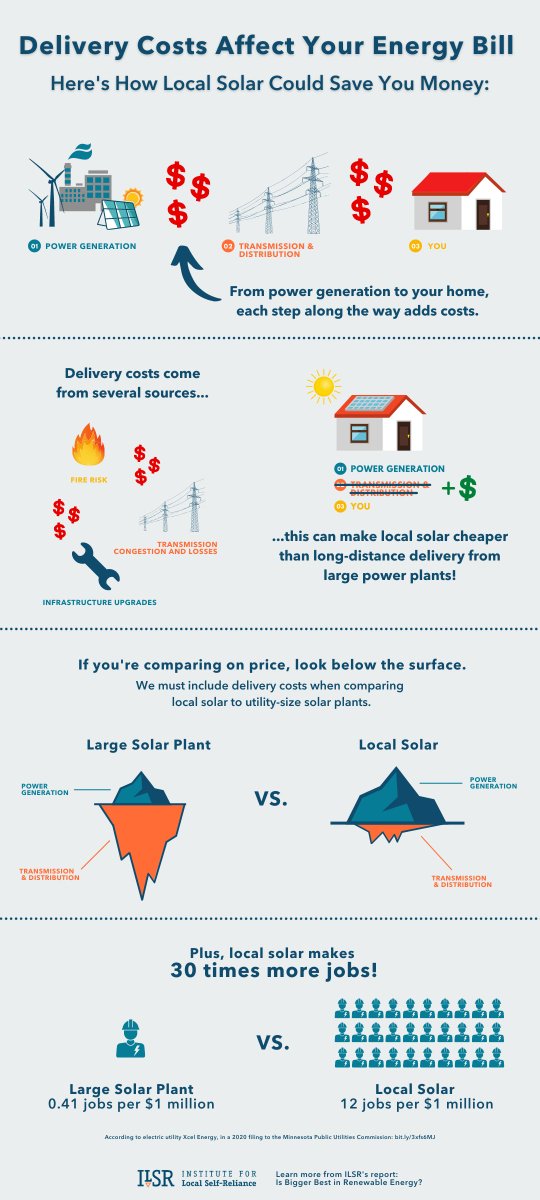THREAD on comparing utility-scale and rooftop solar, sparked by a good question from @jeffsaintjohn on LinkedIn about this post on jobs from solar. https://twitter.com/johnffarrell/status/1389230435587211264">https://twitter.com/johnffarr...
While my original post compares utility-scale and rooftop solar, we ought to spend less time comparing them because a) they aren& #39;t subject to reasonable comparison and b) it& #39;s the utility& #39;s playbook. Here& #39;s a few examples:
1) Utility-scale solar and rooftop solar aren& #39;t comparable because one is wholesale, the other retail. Big solar has socialized delivery costs (all customers pay for its transmission and distribution). Rooftop solar provides power at retail, with no delivery cost.
2) Utility-scale solar and rooftop solar don& #39;t source capital from the same entities. One is paid for by utilities or large developers, the other by customers using cash or bank financing.
3) Utility-scale solar and rooftop solar are not treated the same in resource planning (supply v. demand reduction). Utilities don& #39;t plan for what they don& #39;t own, and when they try to forecast customer-owned solar, they suck at it: https://ilsr.org/report-utility-distributed-energy-forecasts-2020/">https://ilsr.org/report-ut...
4) Utility-scale solar and rooftop solar have different operational characteristics. One provides bulk power and then other can, paired with storage, offer resilience.
5) Utility-scale solar doesn& #39;t fundamentally change a market structure that favors concentrated capital and ownership. Rooftop solar allow customers, individually or collectively, to reduce their reliance on a (often monopoly) company.
6) Utility-scale solar is more likely to use union labor but rooftop solar is more likely to support small, independent businesses (both of which could do more to include historically marginalized communities).
Why do we compare utility-scale and rooftop solar on price? It& #39;s because utility company lobbyists know that it& #39;s the most meaningful metric for them––their company& #39;s profits rely on returns on capital expended on big power plants and the delivery infrastructure!
A number of advocates, including me, have pushed back within confines of the price discussion with the "value of solar" discussion. Even with plenty of good evidence showing distributed solar& #39;s value, we& #39;re fighting on utility turf. https://ilsr.org/minnesotas-value-of-solar/">https://ilsr.org/minnesota...
It& #39;s one reason I get frustrated with some of the accurate and well-intentioned analysis by @JesseJenkins and others. If electricity market decisions were shaped by facts, the value of solar conversation is terrific! But they aren& #39;t!
Edison Electric Institute, the trade org of investor-owned utilities, described solar as an existential threat -- a death spiral -- eight years ago because of its disproportionate impact on utility profits.
Utilities would have us believe this is a simple discourse about the lowest cost power source. But what& #39;s at stake is much larger. See this petition to @FERC from @CenterForBioDiv: https://biologicaldiversity.org/w/news/press-releases/legal-petition-aims-to-stop-utilities-from-forcing-customers-to-bankroll-anti-environment-trade-groups-2021-03-17/">https://biologicaldiversity.org/w/news/pr...
Monopolized electricity markets have given large corporations the license to use money from their captive customers to lobby against oversight, against clean energy, against solar. They have caused the climate crisis and its disproportionate impact on communities of color.
See the terrific work documenting this behavior by @EnergyandPolicy @NAACP and others: https://grist.org/race/naacp-fossil-fuels-utilities-donations-influence-manipulation/">https://grist.org/race/naac...
The solution, as with @Amazon and @Facebook and other monopolists, is to reduce utilities& #39; market and political power so that they can& #39;t abuse it.
Choosing local, independently-owned solar is not solely an electricity procurement decision, as utilities would have us believe. It helps us develop more competitive, equitable, and democratic energy markets by lifting up alternative owners and participants in the energy system.
See @SolarNeighbors for the power of this alternative: help folks cut their bills with solar and then organize them to support a cleaner and more equitable energy system!
So @ILSR will fight the utility& #39;s bogus cost comparisons between utility-scale and local solar, but we& #39;ll also help expose the conversation for what it is: an attempt to obscure an opportunity to democratize the electricity system, one panel at a time.  https://abs.twimg.com/emoji/v2/... draggable="false" alt="☀" title="Sonne mit Strahlen" aria-label="Emoji: Sonne mit Strahlen">
https://abs.twimg.com/emoji/v2/... draggable="false" alt="☀" title="Sonne mit Strahlen" aria-label="Emoji: Sonne mit Strahlen">

 Read on Twitter
Read on Twitter " title="So @ILSR will fight the utility& #39;s bogus cost comparisons between utility-scale and local solar, but we& #39;ll also help expose the conversation for what it is: an attempt to obscure an opportunity to democratize the electricity system, one panel at a time. https://abs.twimg.com/emoji/v2/... draggable="false" alt="☀" title="Sonne mit Strahlen" aria-label="Emoji: Sonne mit Strahlen">" class="img-responsive" style="max-width:100%;"/>
" title="So @ILSR will fight the utility& #39;s bogus cost comparisons between utility-scale and local solar, but we& #39;ll also help expose the conversation for what it is: an attempt to obscure an opportunity to democratize the electricity system, one panel at a time. https://abs.twimg.com/emoji/v2/... draggable="false" alt="☀" title="Sonne mit Strahlen" aria-label="Emoji: Sonne mit Strahlen">" class="img-responsive" style="max-width:100%;"/>


